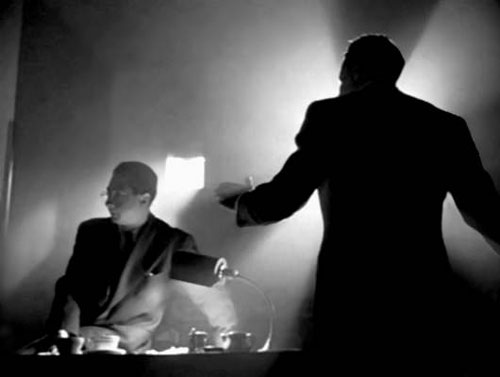Well, frankly, I still don't get it. It's a good film, sure, but the greatest film ever? Why? What makes it so damn good?
Yes, the cinematography is unquestionably excellent. Gregg Toland produces some magnificently iconic shots, and his use of deep staging is superb. There were some great technical innovations, true, but technical innovation does not make a great film, it makes a cleverly created one.
 A lovely atmospheric shot - but is it any better than what Universal were doing in their monster movies around the same time?
A lovely atmospheric shot - but is it any better than what Universal were doing in their monster movies around the same time?Welles's acting is powerful, but not, in my opinion, a truly awesome performance compared to many others - Mitchum in Night of the Hunter, Neeson in Schindler's List, Brando in Godfather, Hurt in Elephant Man, or Depp in quite a lot of things. The rest of the cast are fine, but that's it. The music is OK, but lacks the punch of scores like Scott of the Antarctic, The Sea Hawk, Battle of Britain, or even Star Wars, Pirates of the Caribbean or Gladiator. The story doesn't really resonate with me - Hearst was a foreign media mogul of times past, who's even less relevant to me than Robert Maxwell. And yes, the script has some good lines, but I think it's often confusing and loses pace.
I'd say that Kane is an extraordinarily well-shot film, with an interesting structure, but I still don't see why so many people think it's the greatest film of all time. Wikipedia's page on films considered the greatest ever makes interesting reading - it's as if great film-making stopped in the 1950s, according to critics and directors. I love old movies, but I don't feel that movie-making reached its peak in its first half century. Do we really think that no film made in the last 67 years was as good as the 25-year old Welles's 1941 debut piece?
I don't know what I'd consider the greatest film ever, but it sure as hell ain't Kane. What do you think?




8 comments:
You already know what I think ...
I ask myself the same question about a lot of old films. First i thought that the explanation would be that they have developted some cool cinema-lenguage stuff or used it the first time in a cool movie. At least that is what I like in films such as Potemkin. But anyhow I think that if you are an educated filmfreak it seems to be somehow "cool" to say that old films are the greatest and at least it shows that you know some film history.
I would have to say that the context of the film, the real world circumstances surrounding the film, the problems Welles had, elevate it.
That said, I still think it would be on my top five list of favorite films ever (not the top).
It seems that you do not consider the whole greater than the sum of the parts?
erik - absolutely. It's as if saying that old films are good and new ones are all crap makes you a "serious" or "educated" person.
bllius - I don't agree. The problems Welles faced may imply that actually making Kane was a great achievement, but that doesn't make the film great. imho to be a great film, it has to stand artistically irrespective of the historical context, and be judged purely on its merits as a film. I regard Welles as a great film-maker, but I don't regard many of his films as great.
johnnie - you're in need of serious help, my friend. ;)
I'm saying that the context elevates the movie in the viewer's mind, not that it should, simply that it does.
And actually, how can you utterly divorce art from context?
And on Welles. How many of his films were his own?
Sorry, I misunderstood you!
How can you divorce art from context? By not knowing about the context.
As for your final comment, the same could be said of most films, though. How many films are the work of just one person? Well, in the machinima world, quite a lot!
Context is everything. Humans thrive on it.
"How can you divorce art from context? By not knowing about the context."
This experiment has been done (I blogged about it). Humans function poorly in an environment bereft of context (say, like the internet).
"As for your final comment, the same could be said of most films, though. How many films are the work of just one person? Well, in the machinima world, quite a lot!"
What I mean by this is AFAIK, Citizen Kane is the only Welles film where he had final cut. In his other films he did not have final control and it is possible that his 'art' suffered for it (of course, it probably suffered when he did have control). I'd be interested in seeing some of his pre-film work on the stage and listening to some of his radio work.
Agreed, humans need context. But I don't need to know the story behind the making of a film to enjoy it. In fact, I generally prefer not to know until afterwards.
I do find the story of how Kane got made fascinating, and an important stage in the development of film. I just didn't like the movie itself that much, and don't think it deserves the accolades it still receives.
Post a Comment